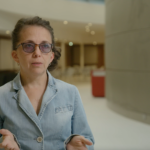UK Citizens’ Jury on Genome Editing














20-minute documentary on the Citizens’ Jury
View the 3 minute trailer and 10 minute versions of the documentary here
Scientists can now edit the code of life (the genome) with relative ease and precision. However, the idea of permanently changing the human genome in future generations generates strong opinions. In the UK, as in most countries worldwide, it is illegal to perform genome editing on embryos that lead to pregnancy.
Whilst the editing process is not currently 100% accurate, scientists predict that it soon will be. This means that public audiences should be brought into the conversation now about the application of the technology so that policy makers can take account of societal perspectives when discussing the legislation. Being able to change the DNA of human embryos has been hailed as a game changer for potentially curing some hereditary genetic disorders from all future generations in a family. However, for cultural, religious, or ethical reasons, some feel the manipulation of human embryos is a step too far for society.
Families with a known genetic disorder already have the option to use genetic testing to try and have children who are unaffected by the disease. But these technologies don’t work for everyone.
THE CITIZENS JURY
For a week in September 2022, 21 people with personal experience of genetic disease travelled from across the UK to the Wellcome Genome Campus near Cambridge to sit as members of the UK Citizens Jury on Genome Editing. The jury members were selected to broadly reflect the demographic make-up of patients who are eligible to use genomic medicine services and genetic counselling in the NHS.
A citizens jury typically involves a period of intense learning from experts, focused deliberations, voting on an ethical question and the writing of policy recommendations – and that is exactly what they did here.
The aim was to provide an insight into the perspectives of a group of patients with inherited genetic conditions on what they think about the benefits, risks and wider harms emerging from the application of embryo genome editing. Their recommendations support policy makers, researchers and wider civil society to better understand informed public perspectives.
The jurors welcomed the opportunity to have their voices heard and felt that public engagement on genome editing shouldn’t be left to chance. The technology is developing fast and the jurors believed that some groups would start lobbying for a change in the law in the not-too-distant future.
They asked for policy makers to be proactive in shaping the inevitable debate which will begin and ensure that all voices within society are heard as it develops. Many of the jurors were clear that they did not want to stop scientific advancement but rather wanted it to be done in a transparent way that took account of their lived experience of having or being affected by a serious genetic disease. Changing the DNA of human embryos was re-framed by some of the jurors as a form of ‘treatment’ for genetic disease (and thus this term is used in the report).
The citizens jury deliberated over 4 days on the following question:
Are there any circumstances under which a UK Government should consider changing the law to allow intentional genome editing of human embryos for serious genetic conditions?
When polled at the end of the process the majority of the jurors agreed (17 to 4) that the government should consider changing the law to allow intentional genome editing of human embryos for serious genetic conditions, and most felt that these discussions should be beginning now.
The views that informed this conclusion were nuanced and complex and, whilst the majority expressed broad support for the clinical application of the technology, there were limitations and conditions attached to this. A minority also felt extremely concerned about the structural inequalities for disabled people that currently exist and thus could not contemplate supporting embryo editing at the present time.
The jury has been a rollercoaster emotionally and mentally. It has been amazing to hear the personal stories of the others on the jury. I won’t call myself a ‘juror’ but a member of the UK jury family
There are not many positives about living with a rare disease, but the experience of the Citizens Jury has certainly been one of them. I am grateful to have had this unique opportunity to have my say on one of society’s most complex and significant issues.
– COMMENTS FROM JURORS AT THE END OF THE PROCESS
Commissioned and delivered by

Project partners

Film made by

Downloads:
 A video explaining what gene editing is. From Wellcome Trust & the Royal Society (mp4)
A video explaining what gene editing is. From Wellcome Trust & the Royal Society (mp4)
 Citizens' Jury Embryo Editing Report
Citizens' Jury Embryo Editing Report


